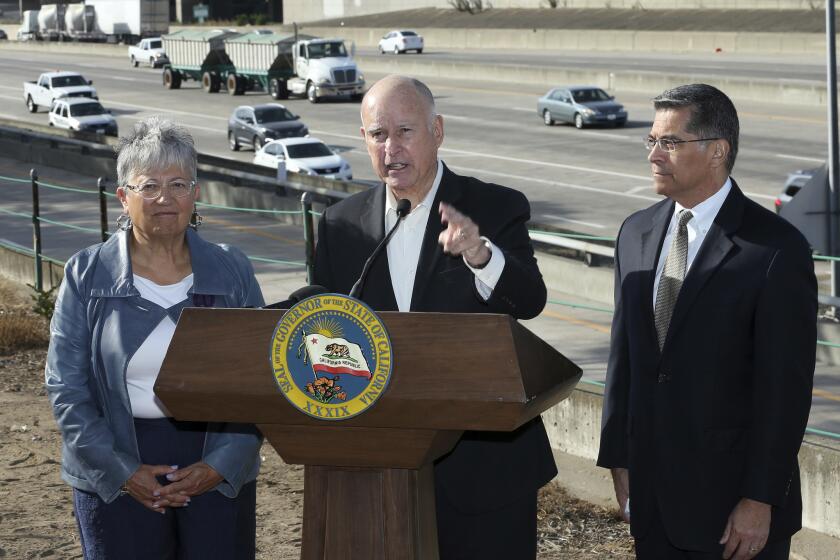Column: In landmark session, the California Legislature shows what progressive lawmaking looks like
California is often identified as one of the most liberal states in the union — perhaps the most liberal. In the session just ended, its Legislature showed its willingness to live up to that standard.
Among the measures passed in Sacramento were bills to enforce worker employment rights at “gig economy” firms such as Uber and Lyft; to require that student athletes be paid for the commercial use of their names and likenesses; to enforce childhood vaccination rules; to mandate access to abortion pills at state colleges and universities; and to place caps on rent increases and predatory interest rates on loans.
What makes many of these legislative initiatives important is that they run counter to trends in other states and in Washington. The assault on abortion rights is in full cry in statehouses across the Midwest and South and in the Trump administration. Worker rights to good pay, safe workplaces and unionization are undermined by the refusal of Trump’s National Labor Relations Board to prevent employers from classifying their workers as “independent contractors” in order to limit their pay, benefits and organizing rights.
One should view the session as a project in progress. It won’t produce a progressive heaven on Earth, in part because not every bill will become law; Gov. Gavin Newsom hasn’t committed himself to signing them all, and some are facing intense pushback from the interests they’d gore.
It’s certainly not news that wealthy and powerful interests tend to line up against laws taking the side of workers. Uber, Lyft and DoorDash already have committed $30 million each for a ballot measure to overturn the gig economy bill, AB 5, in 2020. (Newsom signed the bill Wednesday.) The National Collegiate Athletic Assn., or NCAA, has strongly opposed the so-called Fair Pay to Play Act (SB 206). This bill would give student-athletes at California colleges and universities the right to be paid for the use of their “name, image or likeness,” say in highlight clips or video games. The NCAA threatened in June to bar California universities from NCAA championships if the measure passed. The Legislature saw this threat to keep such athletic mainstays as USC, Stanford and UCLA out of its championships as empty blustering, and passed the bill without a single vote in opposition.
The right-wing campaign to demonize the tiny delta smelt so Big Ag can get more water continues, ignorantly
The NCAA, which seems to think the measure will bring the entire edifice of college sports crashing down, has asked Newsom for a veto. The governor hasn’t said whether he’ll knuckle under or give student athletes a piece of the profits reaped from their own efforts by coaches, TV networks and NCAA officials (2017 pay of NCAA President Mark Emmert: $3.9 million).
Some bills will have unintended consequences that could prompt reconsideration in the future. And some will expire if they’re not renewed — such as a measure capping annual residential rent increases at 5% plus inflation and limiting landlords’ ability to evict tenants after a year’s residency. The bill is expected to gain Newsom’s signature but will sunset in 10 years.
Some bills were put off until next year. They include two measures aimed at reducing plastics pollution, in part by mandating that single-use utensils be recyclable or compostable. Another would require the Department of Corrections to house prisoners according to their gender identity, not their gender at birth.
The biggest disconnect between the Legislature and governor has been over SB 1, which might be defined as the Trump Antidote Bill.
Uber, Lyft and Doordash will spend $90 million to undercut a California employment law.
This measure, sponsored by Senate President Pro Tem Toni Atkins (D-San Diego), would come into play if Trump rolls back regulatory provisions in any of seven federal laws — the Clean Air, Clean Water, Safe Drinking Water, Endangered Species, Fair Labor Standards, Occupational Safety and Health and Coal Mine Health and Safety acts. If that happens, state agencies would have the authority to maintain California regulations as they stood Jan. 19, 2017 (that is, the day before the Trump inauguration).
Newsom says he’ll veto SB 1, evidently responding to pressure from Central Valley farming interests, their Washington protector Sen. Dianne Feinstein (D-Calif.) and the Metropolitan Water District of Southern California, among other opponents. They argue that the bill would hamper efforts to craft rational statewide water policies.
The MWD, which serves 19 million Southern California residents, opposed the bill because “it would have unleashed rounds of state-federal litigation, and would have likely brought 13 years of effort to a halt,” as its general manager, Jeffrey Kightlinger, wrote in a commentary published Tuesday at Calmatters.org. “It was about keeping intact this historic window of opportunity to make generational changes in California water.”
California’s climate deal with automakers shows the proper solution to Trump is to go around him.
In any event, Trump himself put Newsom in a tight spot on the measure Wednesday by unilaterally revoking the state’s authority to set its own auto emission standards. Trump could hardly have chosen a more vivid means and more timely moment to underscore California’s need to erect a bulwark against his obnoxious and unhealthy environmental policies. Newsom, along with other state officials, has promised to fight Trump’s revocation in court, but signing SB 1 would send a louder signal that the state can’t be pushed around.
The landmark bill of this landmark session was surely AB 5, the gig economy bill. The measure aims to cement into law a state Supreme Court ruling last year that established guidelines for determining whether a worker is an independent contractor — as Uber, Lyft and other such companies designate their rank-and-file workers — or an employee. The latter are protected by minimum wage rules and entitled to overtime pay and other benefits; the former are not.
The court set forth the so-called ABC test: Workers are employees unless they’re (A) independent of the hiring entity’s control and direction about how they perform their work; (B) engaged in work different from the hiring entity’s business; and (C) conducting an independent business in the same field as the work they’re doing for the hiring entity.
In other words, a plumber hired by a clothing store to fix a leaky bathroom: independent contractor. A driver picking up passengers for Uber: employee. (Newspapers such as The Times won a one-year reprieve from the law, to January 2021, before reclassifying their carriers as employees rather than independent contractors.)
It’s always fun to see a bully get upended in the schoolyard.
Uber and Lyft acknowledge that designating their drivers as employees will drive up their costs and force them to rewrite their business models, which depend on saddling drivers with expenses such as fuel, insurance and maintenance.
How the drivers themselves feel about the law is hard to discern. Some driver activists have pressed for passage of AB 5; but others — including some brought to Sacramento by the ride-hailing companies during the legislative debate — have expressed concerns that it will result in less work, or less convenient working conditions, for them.
The companies say the changes forced on them by AB 5 would deprive drivers of a feature of their work they value deeply: the flexibility to set their own schedules. Nothing in the law would require that the companies hold drivers to fixed schedules, however.
Uber has communicated to its drivers — and the public — that it won’t automatically reclassify drivers as employees even after AB 5 goes into effect in January, but will fight reclassification in court. Its position is that driving for hire is outside its normal business, which it says is providing technology, not rides. (In other words, it claims it can pass test B.)
Legal experts say nothing prevents California from trying to define “employee” for the purpose of wage and hour law. What AB 5 can’t do is guarantee drivers the right of collective bargaining.
That’s because the National Labor Relations Board, through its general counsel’s office, has ruled that Uber drivers are independent contractors and therefore ineligible to unionize. That roadblock has prompted some California union leaders to jawbone with the ride-hailing companies over a hybrid working category that would grant drivers some employment-style benefits without officially making them employees. Those discussions haven’t thus far yielded a solution, however.
How this will all shake out in practice is unknown. Libertarian commentator Megan McArdle suggests that the law will prompt the companies to drop all but their best-performing drivers and even to withdraw from California completely. These options seem barely plausible, except perhaps as ploys to gain support for their possible 2020 ballot measure. Paring back their driver corps would mean longer wait times for passengers, undercutting the quick response to passenger bookings that is among their chief selling points. And because Los Angeles is one of Uber’s top three U.S. markets, leaving California seems a remote possibility at best.
McArdle, like other conservatives, laments that with the ride-hailing companies already recording massive losses even while exploiting their drivers, raising their costs of doing business won’t make them any healthier. In the second quarter of this year, Uber lost a stunning $5.2 billion on revenue of $3.2 billion, and Lyft lost $644 million on revenue of $867 million. That suggests that both companies would be overdue for a reconsideration of their business models even if AB 5 never existed.
One can consider the legislative session this year as a great experiment in inclusionary lawmaking. The legislators’ vision wasn’t perfect, not all the bills were flawless, and in some respects the lawmakers and the governor were marching to different tunes even if they belong to the same party.
We will undoubtedly hear warnings in the wake of this session that California Democrats overreach by trying to enact laws to protect workers, renters, borrowers and the environment. But there are no indications as yet that the voters who gave them a strong majority in Sacramento expected them not to use it. California has been a bellwether for national politics in the past — witness how immigrant-bashing dating back to Proposition 187 in 1994 reduced the state’s Republican Party to impotence. Conservative legislatures are driving some other states further to the right than the American electorate as a whole. California may be showing that the future beckons from the other direction.
More to Read
Inside the business of entertainment
The Wide Shot brings you news, analysis and insights on everything from streaming wars to production — and what it all means for the future.
You may occasionally receive promotional content from the Los Angeles Times.














